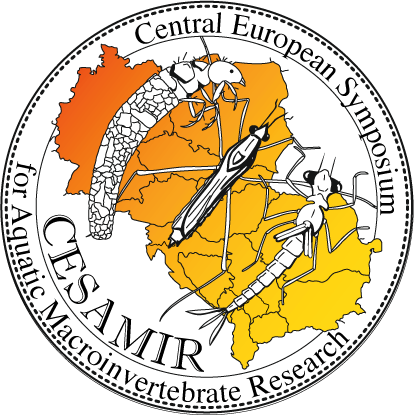
Sessions & Workshops
Finally, at CESAMIR 2024 conference we will have nine Regular Sessions, two Special Sessions and one optional Workshop.

Regular Sessions
RS1: Diversity – Biogeography – Phylogeography
RS2: Anthropogenic Impacts & Bioindicators
RS3: Monitoring & Conservation
RS4: DNA Barcoding
RS5: Ecology, Climate Change & Parasites
RS6: Invasive Species
RS7: Fauna of Lake Ohrid
RS8: Taxonomy & Morphology
RS9: DNA Metabarcoding
Special Sessions
SS1: Exploring aquatic diversity in the Carpathian biodiversity hotspot: from species level to molecular patterns
Organizers: Michał Grabowski (1), Fedor Čiampor (2), Tomasz Mamos (1), Zoltán Csabai (3)
(1) Department of Invertebrate Zoology & Hydrobiology, University of Lodz, Poland
(2) Department of Biodiversity and Ecology, Plant Science and Biodiversity Centre, Slovak Academy of Sciences, Slovakia
(3) Department of Hydrobiology, University of Pécs, Pécs, Hungary
Carpathian region, including both the Carpathian Arch and the Carpathian Basin, is recognised as a biodiversity and endemism hotspot of global importance. However, most of the studies focus on terrestrial organisms, while the aquatic biota and its distribution patterns are relatively poorly recognised. This is surprising, taking into account that the local freshwater resources are of critical importance and their biota is highly threatened. Besides the low level of awareness and low level of support for science, one of the reasons behind the lack of sufficient knowledge of the aquatic biodiversity in this region is insufficient cooperation between countries of the Carpathian region. Such fragmentation results in uneven distribution of specialists and funding as well as limiting the knowledge transfer. Another problem is the putatively high number of taxa difficult to recognise or even cryptic. Thus, this special session will focus on research documenting biodiversity as well as its spatial distribution patterns in ecological and evolutionary context in all kinds of aquatic ecosystems in the Carpathian Region. We invite all researchers, especially those working in poorly known taxa, less explored aquatic or whose research extends beyond one geographic region/country, to share their findings. This will help us all not only to correctly identify knowledge gaps on aquatic biodiversity in the region, but also to effectively fill them in the future through international cooperation.
SS2: Multilevel responses of aquatic macroinvertebrates to drying in freshwater ecosystems
Organizers: Núria Bonada (1), Zoltán Csabai (2), Thibault Datry (3)
(1) FEHM-Lab, Department of Evolutionary Biology, Ecology and Environmental Sciences, University of Barcelona, Barcelona, Spain
(2) Department of Hydrobiology, University of Pécs, Pécs, Hungary
(3) National Research Institute for Agriculture, Food and Environment (INRAE), UR RiverLy, Villeurbanne, Franc
The drying of freshwaters is increasing worldwide, exerting profound alterations on biological communities. Responses to drying appear at all levels of organization, from genes to physiological resilience and species distribution to metacommunity and food web structures. This special session gathers innovative and recent research on freshwater ecosystems, unraveling the profound effects of drying on aquatic macroinvertebrates. We expect several insights from the DRYvER project, but the session is open to anyone. Join us and share your findings, engage in insightful discussions, and contribute to our collective understanding of how aquatic macroinvertebrates navigate the unprecedented challenges posed by global change.
Workshop: Nanopore Sequencing for Biologists
Workshop will be provided by the conference partner, the NGS GEEKS Division of I.T.A.-Intertact, s.r.o., which states that “Every month there are many innovations in NGS. Some take our breath away, others make us laugh out loud”. The workshop is combined with the Presentaion entitled “Technologies for Advanced Biology Research”.
Presentation will introduce us the development of various approaches to studying biology using specific methods for NGS library preparation is so rapid that not many can follow up. It will include a pre-selected overview of technologies that are, in our opinion, of high interest to experimental field biologists, solving the most burning issues such as (i) insufficient amount of sample, (ii) detailed analysis of genome and transcriptome, (iii) low quality of nucleic acid, (iv) portable instrumentation for qPCR and sequencing, or (v) user-friendly sample storage management.
The workshop’s scope is to educate participants on Oxford Nanopore sequencing technology and the manual work necessary to create a sequencing library and launch sequencing experiments. Short part will be dedicated to sequencing experiment QC data analysis in EPI2ME analysis software.
